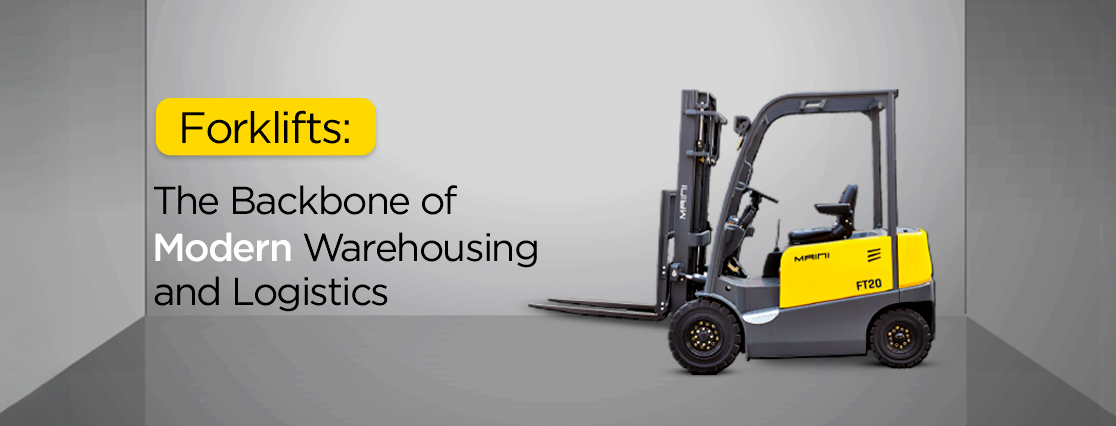Forklifts: The Backbone of Modern Warehousing and Logistics

If you are in a warehouse or logistics centre business, you already know the importance of the forklift - one of those machines that ensure a seamless flow of operations. They have become an integral part of modern warehousing and logistics.
Revolutionizing how goods are handled-from compact lift trucks to heavy-duty diesel forklifts, these machines play a critical role in keeping supply chains moving efficiently.
Why Forklifts are Essential in Warehousing and Logistics
Is it even possible to run a warehouse without forklifts? It's like building a skyscraper without cranes! Forklift machines and specialized lift trucks reduce manual labour, making the difficult task of moving heavy objects manageable, thus vastly increasing productivity. Not only does this save labour costs, but it also decreases the risk of injury.
Forklift machines help make stacking, loading, and unloading goods quicker and safer, and they ensure smooth operations while preventing inconvenient and expensive hold-ups. They save time and make stacking, loading, and unloading much safer, improving operations and averting costly delays. As the warehouses expand in size and capacity, the reliance on diesel forklifts and other types of lift trucks only grows.
Types of Forklifts for Different Needs
Lift Trucks for Light to Medium Loads
Lift trucks suit small warehouses or centres handling light and medium loads. Compact and very manoeuvrable, they can go into restricted spaces, making them an ideal facility in narrow-aisle processes.
Lift trucks are capable of lifting orders, loading pallets, and moving inventory within the warehouse. You might consider getting a lift truck to boost your workflow's effectiveness if you run a small or medium-sized business.
Diesel Forklifts for Heavy-Duty Operations
For heavy lifting, nothing beats a diesel forklift. These powerful forklift machines are designed for outdoor operations and large warehouses where strength and endurance are key. Diesel forklifts can handle larger, bulkier items that lighter lift trucks cannot manage.
Another advantage of diesel forklifts is that they can be used for a longer period compared to the electric forklift without having to be frequently recharged. Thus, they are widely used in operations where continuous heavy lifting takes place.
Key Benefits of Using Forklifts in Warehousing
1. Increased Efficiency and Productivity
Forklifts are valuable assets for moving goods, as they significantly reduce the time required to transport items from one location to another. With a diesel forklift or lift truck, workers can quickly move items across large areas that would otherwise take much longer to carry by hand.
2. Enhanced Safety
Employing forklifts tends to relieve workers from physical stress, eradicating the chances of getting hurt. Forklift machines provide safety measures such as alarms, flashing lights, and backup sensors, which make operations secure.
3. Cost-Effective Operations
The cost of buying any industrial equipment may seem expensive at a glance, but as time goes by, it allows for reduced operational costs and an array of efficiency, meaning that it was worth the purchase in every aspect. As diesel forklifts are known for their great durability, businesses will definitely see the profits from the investments they make.
How to Choose the Right Forklift for Your Warehouse
Each warehouse has its own requirements, which dictate which forklift would work best. Here are a few pointers to help you make the right choice:
Assess Load Requirements: If you deal with heavy bulk goods, a diesel forklift is a must. For dealing with lighter and low-bulk goods, lifting trucks and electric lifts work just fine.
Consider Space Constraints: Narrow aisles make it easy to use compact lift trucks that can better manoeuvre.
Evaluate Fuel Efficiency: For longer shifts, diesel forklifts work best, but if you're thinking of going green, then electric ones are better.
Forklift Maintenance: Keeping Operations Smooth Enforcing basic maintenance on your forklifts is important if you want them to last long and be operational at maximum power. Most diesel forklifts are known to consume extreme amounts of energy and, therefore, have to be fueled up with oil at regular intervals. If not done so, they will require a hefty amount of fixes as well as downtime.
One of the best practices is putting a good maintenance regime in place so that your forklifts and their working parts do not toil, as it may lead to unscheduled outages and disrupt your sortation and supply processes.
Future of Forklifts in Warehousing and Logistics
Forklifts can now do a lot more with the help of technology; the rate of efficiency is skyrocketing, and it's only going higher. A new age of automated lift trucks and electric forklift machines only marks greatness for the future of warehousing; on the contrary, diesel forklifts still have their use for industrial purposes.
You can expect huge improvements in years to come with better integration of AI and IoT technologies in forklifts with the capabilities to track data better and forecast maintenance. These changes will improve the safety and effectiveness of the core activities.
Wrap-Up: Forklifts as the Backbone of Logistics
It can be said that forklifts are far more than mechanical devices; they are the essential elements of today's warehousing and logistics activities. Every single lift truck, from the smallest one to the most powerful diesel forklifts, plays an important role in supply chain operations, which include the storage, transportation, and delivery of products.
For small business owners and large-scale logistics managers alike, purchasing a forklift is a step towards more efficient and safe operations that will be less costly. If we include these extraordinary machines in warehouses, we can say that they will continue to be one of the most effective logistics devices.
Taking the example of forklifts and their utility, one can understand how it can be advantageous for a business to have all relevant knowledge at hand. Next time you see a forklift in motion, consider this: It's not just transporting items from one location to the other; it's keeping the logistics world afloat.



